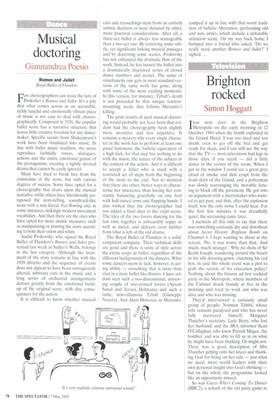Musical doctoring
Giannandrea Poesio
Romeo and Juliet Royal Ballet of Flanders
-Clew choreographers can resist the lure of
Prokofiev's Romeo and Juliet. It's a pity that what comes across as an accessible, richly tuneful and emotionally vibrant piece of music is not easy to deal with choreographically. Composed in 1938, the popular ballet score has a narrative structure that leaves little creative freedom for any dancemaker. Specific scenes from Shakespeare's work have been translated into music. In line with ballet music tradition, the notes reproduce faithfully voices, dialogues, actions and the entire emotional gamut of the protagonists, creating a tightly devised drama that cannot be easily ignored.
Many have tried to break free from the constraints of the score, but with various degrees of success, Some have opted for a choreography that draws upon the musical narrative, while others have intentionally juxtaposed the story-telling, soundtrack-like score with a non literal, free-flowing and, in some instances, strikingly modern movement vocabulary. And then there are the ones who have opted for more drastic measures, such as manipulating or pruning the score according to both their vision and whim.
Andre Prokovsky, who signed the Royal Ballet of Flanders's Romeo and Juliet presented last week at Sadler's Wells, belongs in the last category. Although the treatment of the story remains in line with the 1938 libretto and the sequence of events does not appear to have been outrageously altered, arbitrary cuts in the music and a long series of orchestral arrangements detract greatly from the emotional buildup of the original score, with dire consequences for the action.
It is difficult to know whether musical Cuts and retouchings stem from an entirely artistic decision or were dictated by other, more practical considerations. After all, a three-act ballet is always less manageable than a two-act one. By removing some subtle, yet significant linking musical passages and by doctoring some scenes, Prokovsky has not enhanced the dramatic flow of the work. Instead, he has turned the ballet into a dramatically disjointed series of closed dance numbers and scenes. The sense of simultaneity one gets in most standard versions of the same work has gone, along with some of the most exciting moments. In this version, for instance. Tybalt's death is not preceded by that unique tensionmounting scene that follows Mercutio's killing.
The grim results of such musical doctoring would probably not have been that evident had the choreography been slightly more inventive and less repetitive. It remains a mystery why every single character in the work has to perform at least one grand battement, the balletic equivalent of a high kick, for that step has nothing to do with the music, the nature of the subject or the content of the action. And it is difficult to accept a Juliet who is stuck with a restricted set of steps from the beginning of the story to the end. Not to mention that there are other, better ways to characterise her innocence than having her constantly balancing gracefully on one foot with half-raised arms and flapping hands, I also wished that the choreographer had not added a final duet in the crypt scene. The idea of the two lovers dancing for the last time together is unbearably soppy as well as dated, and detracts even further from what is left of the old drama.
The Royal Ballet of Flanders is a solid, competent company. Their technical skills are good and there is unity of style across the entire corps de ballet, regardless of the different backgrounds of the dancers. What some dancers seem to lack, however, is acting ability — something that is more than vital in a story ballet like Romeo. I have seldom seen such a two-dimensional, unmoving couple of star-crossed lovers (Aysem Sunal and Jeroen Hofrnans) and such a tame, non-villainous Tybalt (Giuseppe Nocera). And Alain Honorez, as Mercutio, camped it up in line with that worst tradition of balletic Mercutios, performing old and new antics, which include a debatable urination scene. On my way back home I bumped into a friend who asked, 'Do we really need another Romeo and Juliet?' I sighed .. .


































































































 Previous page
Previous page